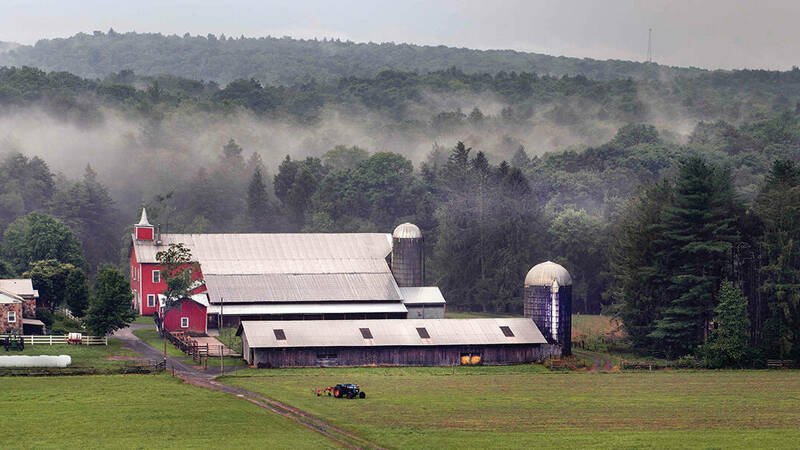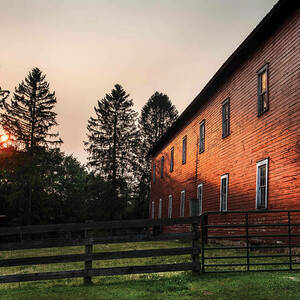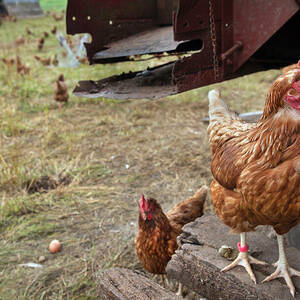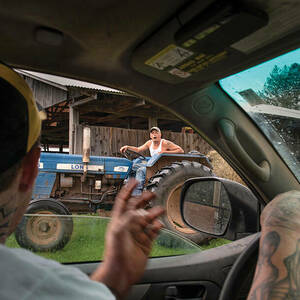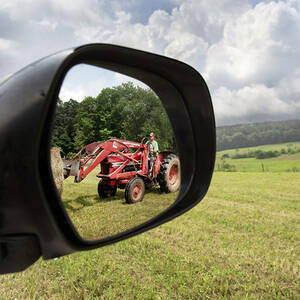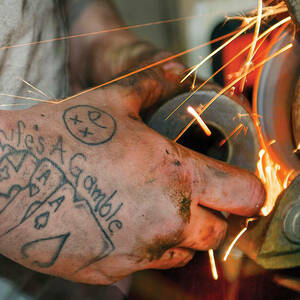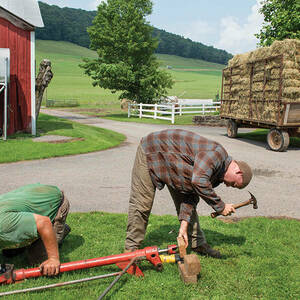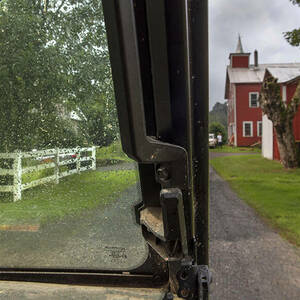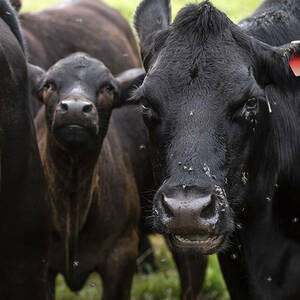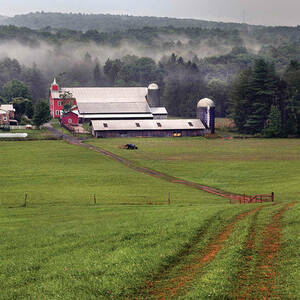Aurora, West Virginia, is a remote place, pretty much on the way to nowhere, a high plateau reachable via an old byway with the overly grand name of the Northwestern Turnpike and nestled in the sort of virgin hemlock forest that once covered the Appalachian highlands. It is garlanded with nine species of fern, three club mosses and more than 50 types of wildflowers. Long ago it was the site of a popular resort that drew summertime revelers from Washington, D.C., Pittsburgh, Cleveland and Baltimore. Today, an innovative drug-rehabilitation center occupies the four remaining resort buildings that sit on a slope by the side of the road. And next door is Brookside Farm, a 270-acre spread now home to range-raised hogs and cattle, to a maple-syrup operation, and to one Edward Utterback.
Actually, Ed Utterback — farmer, onetime fire chief, president of the Preston County stockyard, welcoming presence to more than a dozen recovering addicts at any one time — is the axis around which so much of this remote empire of trees, meadows, farm animals and neighbors revolves. It is an unlikely setting for a man with deep Notre Dame roots, but then again, everything about the Utterback story is unlikely.
That tale begins with a boy from St. Louis whose road to rural West Virginia ran through the old Congregation of Holy Cross seminary that once stood across St. Mary’s Lake from the Log Chapel, where he chose to be a brother rather than a priest. It then took him to a novitiate year in Minnesota, where he continued his studies, and then returned him to Notre Dame for 10 years, where he took architecture classes and did his obediences as a caretaker at Moreau Seminary and other places associated with the University.
But a life in vows was the road Ed Utterback ultimately did not take, and that has made all the difference.
When he was a younger man, his head was full of questions about the direction of his life. After he married, one especially portentous question came not from within but from his father-in-law, Andrew Mance, a country doctor in western Maryland and West Virginia who loved riding the backroads and envied the lives of his patients.
Ever think about farming, Ed?
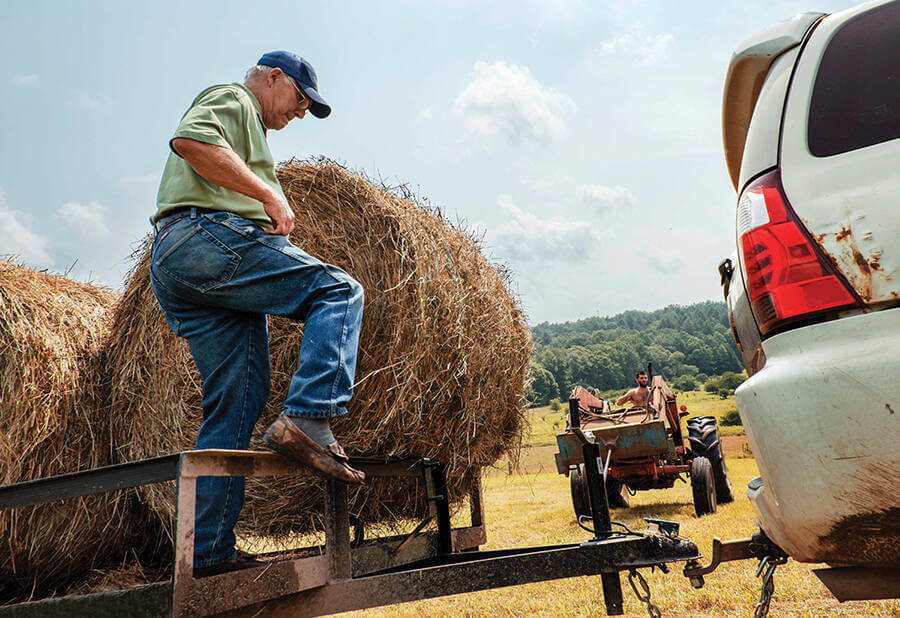
Back then, in the early 1970s, Utterback was putting those Notre Dame architecture courses to use while overseeing the contractors who were building the Sears Tower in Chicago. He had never thought about farming. He’d hardly ever been on a farm. He knew nothing about it. Mance kept pressing, repeatedly telling his new son-in-law to give farming some thought. And the young man did think about it, a little bit anyway — and he thought the idea of living on a farm was, well, nuts.
Still, all that thinking begat a deed — a real one, filed in the county courthouse. Mance quietly bought Brookside Farm, and suddenly Ed, then 34 years old, and his wife, Mary, 31, were farmers, like it or not.
There were many times in the beginning that they didn’t entirely like it.
“The closest I had ever come to a farm was in the novitiate,” Ed says one day in late spring while sitting on his patio, three red barns forming a semicircle around his stone house, a stout rhododendron in late bloom, oaks and maples bending in the breeze along Rhine Creek, the sounds and, more poignant, the smells of the 125-year-old farm filling the air, pungently punctuating the conversation.
“We learned to farm by the book,” Mary says.
The Utterbacks read a lot of books during that hard first year.
Notre Dame is not much of a farm school, though farming is a vital part of the University’s heritage. Holy Cross brothers developed elaborate farming operations shortly after Father Edward Sorin and his companions arrived in the area in 1842, and before long something of an agricultural complex, including an ice house, livestock barns and a granary, grew up not far from where Utterback would attend seminary classes.
The University had an agricultural school from 1917 to ’32, roughly the same years it had Knute Rockne as a football coach. And while Notre Dame may be famous for its subway alumni, its barnyard alumni include a formidable Holstein herd, hundreds of Hampshire hogs and thousands of chickens. For decades, students could see fields of corn, alfalfa and wheat on the campus horizons.
So while Ed Utterback — self-taught and self-motivated in the agricultural arts — veered from the University’s modern profile, in one important aspect he is not really an outlier after all. “In the earliest days of Notre Dame, our students came largely from farm families,” said Rev. John I. Jenkins, CSC, ’76, ’78 M.A., the president of the University. “We can be glad that at least this alumnus has returned to our historical roots.”
By returning to those roots, Utterback did not undertake some gentleman’s pastime. His work is a vocation, one of constant devotion, even for an 81-year-old who now has turned most of his farm’s operations over to his son, Mark, 47.
“They are running a business that becomes more and more complex every day,” says David Spalding, the dean of the Ivy College of Business at Iowa State University. “A lot of people who are very experienced in farming fail. The equipment is complicated, the business is very competitive, and figuring out how to eke out the extra dollar per acre is difficult. It’s a low margin business. Farmers have a machine shed for a reason — so they can keep their repair costs down and in-house. You have to worry about whether the Chinese are slaughtering their herds or building their herds, and you have to worry about the weather in Brazil. It’s more than paying attention to the local grain elevator.”
Today Brookside Farm isn’t exactly a tourist attraction, though people do come by, wandering over from the adjacent Cathedral State Park, or dropping by to see the original blacksmith shop or the old ice house. Every year, Zach Fowler, the director of the 91-acre arboretum of West Virginia University and an associate professor in the school’s biology department, brings a group down the hill and across the bridge as part of a pilgrimage through the flora and mosses that grow amid the park’s 500-year-old, 90-foot trees.
“For us to visit the farm gives a historical and cultural element to these wildflower tours,” Fowler says. “We walk through an old-growth forest that is tied to the history of the farm and the environs. Visiting Ed brings out an important element. He loves the history of the area and understands the importance of what he is doing, the role of that farm in history and in the heyday of Aurora. He is not only backward looking but is also forward looking.’’
And yet tourists once did flock to this mountain hamlet that was settled soon after the drafting of the Declaration of Independence. A century later, America’s urban grandees lolled away their summers at Brookside Resort, where the food was supplied by the farm, dancing in the casino went far into the night and guests arrived by “roads which, for picturesque scenery, are unsurpassed by any in the United States.”
The landscape is still unsurpassed; the area remains an understated and underappreciated slide in America’s scenic View-Master. But the dancing and swimming, the croquet, boating and riding — all elements of what the resort marketed as resembling “a typical country house-party” — were part of another age, as were the “well trained servants and abundant table.” All of it was extinguished by the Great Depression and left to smolder by a nation that learned to vacation differently and to travel by interstate.
Now the old hostelry, the heart of a town that once called itself Salem — the older Biblical name of the city we call Jerusalem — is the home of an addiction-treatment center called Jacob’s Ladder. The facility was created in large measure by Kevin Blankenship, a West Virginia native and a founder of MedExpress Urgent Care, which has clinics as far away as Pittsburgh. Blankenship had a son plagued with addiction, and the experience inspired his vision for a long-term residential recovery program for young men. So he renovated the old resort and struck up an unusual — and unusually close — partnership with Utterback, who gave him a lease for the property and opened his farm to the patients. Today they work at Brookside as part of their rehabilitation.
The goal isn’t to make the men farmers but to make them confident, responsible, purposeful. It is drug therapy, not occupational therapy. They learn the rhythms of the farm — how to operate a tractor, how to take care of chickens and collect eggs. In winter, when the animals are inside, there’s feeding to do, once and sometimes twice a day, and later on there’s lambing and calving. By learning these processes and routines, the men learn farming to be sure, but they also pick up life skills they can apply long after they’ve left the farm.
“This farm was given to me as a gift,” says Utterback. “I want to share this, not to keep it for myself.”
“Ed and his whole family have been gracious and charitable with their time and their farm,” Blankenship says. “We couldn’t have done what we are doing without them — and they’ve changed a lot of young men’s lives.”
The number of changed lives now reaches beyond 100.
None of this was the life the Utterbacks imagined when they got married in 1972.
They didn’t expect their years to be measured in cows or sheep purchased, corn planted, hay made while the sun shined — and sometimes when it didn’t. They didn’t expect to cross-breed cows with bison to produce a lusty, low fat “hamburger” called beefalo. They sure didn’t expect thieves to swoop in by helicopter and steal a three-foot-long copper and zinc bovine weathervane from atop their frequently photographed barn. Nor did they expect that when they sent a son off to Bucknell University to study history, he’d return for a life of farming.
“Being in a religious order, you get used to adapting and doing the work,” Utterback says. “I had to learn to do it. I had no help. And as the kids grew up, I told them that if I was here working, they weren’t going to sit by the television.”
The family’s harvest wasn’t merely agricultural. Listen to the testimony of Ed Utterback, religious-novice-turned-novice-farmer:
“I don’t think you could have a better life. I dread thinking what it would have been like raising four kids in Chicago in this era. This was a good place for them. People around here sometimes are called backwoods people. But people around here work hard, in mines as well as in farms. I’m proud to be part of this, and I’m proud of what we’ve done.”
The couple’s life-altering decision has defined their family. When their son Matthew, 45 — who has a physics degree and manages several businesses — drops by, there unfolds this conversation:
Visiting journalist: “Were you glad you grew up here?”
Matthew: “Not till later.”
“What did you get from your childhood here?”
“Everything.”
He is not alone in thinking so.
A few yards away, in Brookside’s 1890s barn, his brother Mark lies beneath a hay mower, struggling to replace a spinner that’s been jarred loose. He stands up to say hello, his Fighting Irish T-shirt — not worn to impress a visitor but truly worn, maybe for days on end — soiled with grime and sweat.
“They didn’t teach me this at Bucknell,” he says.
The Utterbacks are fluent in Understatement, the lingua franca of their line of work.
“I always just enjoyed it here,” he continues. “I always kind of knew I would come back here and do this. At a minimum, I want to give my son a chance to do something with this farm. My income last year, if I were to pay myself a salary, would be $7,000. But we have been good stewards of the land.”
“This place taught me patience, with myself and with other people,” says Matthew Utterback. “It taught me industriousness and creativity. Only later did I realize that the amount of time I spent in small projects around here gave me wisdom.”
In addition to the legacy he’s sharing with his children, Ed Utterback is a living bridge between the University’s agricultural past and younger alumni such as Brad McDonald ’11.
McDonald is a half-century younger than Utterback. The two men have never met, but McDonald’s story follows a similar path. He majored in economics at Notre Dame, was drawn to commodity training in New York and then to finance in Chicago before he finally started a company to help farmers purchase seed, fertilizers and chemicals online. Eventually he sold his business and bought land adjacent to his family’s farm in Ryan, Iowa.
“On a farm, you are exposed to so many intangible things: a strong work ethic, being closer to nature, family values,” he said. “It is almost like Lou Holtz’s view: ‘Those who know Notre Dame, no explanation’s necessary. Those who don’t, no explanation will suffice.’”
Holtz was right, and so is Mary Utterback, wife and mother of farmers. “Ed loves that others care about what he cares about,” she said. “That’s a big thing.”
It is a big thing indeed.
David Shribman, executive editor emeritus of the Pittsburgh Post-Gazette, teaches American politics at McGill University and is scholar in residence at Carnegie Mellon University.
